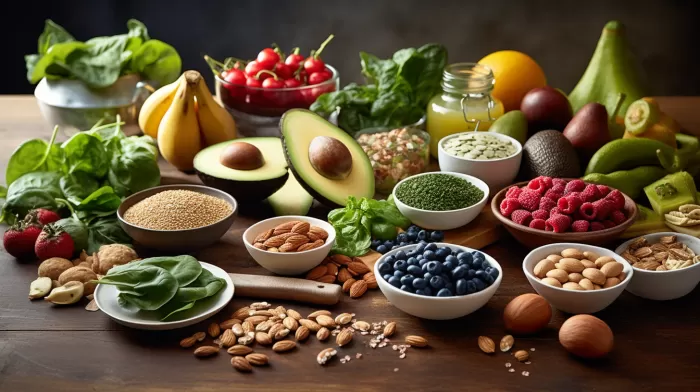When it comes to weight loss, the foods you eat can be just as important as the ones you avoid. In this article, we’ll help you determine which foods are beneficial for weight loss and which ones are not. We’ll also discuss some prescription medications that are approved for weight loss.
Weight Loss Nutrition
Calorie restriction over time has been proven to lead to weight loss. However, focusing solely on calorie restriction without considering a food’s nutrient density can result in unhealthy weight returning and do little for reversing chronic illness. Long-term health requires nutrient-rich foods which are high in fiber, healthy oils, vitamins, minerals, enzymes, antioxidants, and phytochemicals.
If you were to create a list of foods from the highest nutrient concentration to the lowest, you’d have spinach and green leafy vegetables at the top. They would be followed (in this order) by:
- Solid green vegetables (artichokes, asparagus, broccoli, Brussels sprouts, sprouted grains, cabbage, celery, cucumber, peas, green beans, peppers, zucchini)
- Non-green, non-starchy vegetables (beets, mushrooms, onions, garlic, tomatoes, yellow/red peppers, water chestnuts, cauliflower)
- Beans and legumes (kidney beans, red beans, black beans, navy beans, lima beans, soybeans, black-eyed peas, lentils)
- Fresh fruits of all types (bananas, pineapples, and dried fruits have a higher glycemic index)
- Raw nuts and seeds (almonds, English walnuts, flax, chia, sunflower, sesame, and pumpkin seeds); real raw butter and coconut oil, and other healthy oils high in omega-3 to omega-6 ratio like walnut oil, extra virgin olive oil, avocado oil and avocados, and flaxseed oil
- Starchy vegetables (potatoes, squash, pumpkin, turnips, corn, carrots, chestnuts)
- Whole/cut grains (barley, buckwheat, millet, oats, brown rice, wild grain, quinoa, wheat)
- Fish, eggs, fowl, wild meats
- Unpasteurized fresh dairy and spicy cheeses (feta, blue, asiago)
In addition to the fresh and cooked nutrient-rich foods listed above, incorporate fresh juicing, fresh fruit and nut smoothies, and herbal teas often. These should make up 80% or more of your meals (with more than half as raw food). You can then add in a lesser amount of grains (though not bread), fish, eggs, fowl, wild meats, and even beef for most of the remaining percentage of your food. Be sure to opt for grass-fed beef, mercury-free seafood, or free-range fowl and eggs if possible.
Grains can be sprouted, and cooked oatmeal is acceptable in moderation. However, bread and cold cereals have a high glycemic index, meaning they convert quickly to sugar upon digestion and absorption.
Milk products like plain yogurt, kefir, and spicy cheeses are generally great. Many people report feeling more energized and losing weight quickly—within a month—by simply eliminating milk products and bread.
Unhealthy weight gain can be promoted by consuming inflammatory foods at the bottom of the nutrient concentration chart. To maintain a healthy weight, reduce or eliminate these items:
- Fat-free dairy, margarine
- Red meat, pork (especially if containing antibiotics or hormones)
- Full-fat dairy: cow’s milk, processed and other cheeses commonly found on pizza
- Refined white flour products: breads, cookies, cakes, etc.
- Processed and refined sugars, oils, and carbohydrates
- Synthetic additives, colorings, preservatives, or synthetic “foods”
- Any food significantly altered from its natural whole food state
Prescription Medications Approved for Weight Loss
Along with healthy eating, there are some effective prescription medications available for weight loss. There are essentially three FDA-approved medications for weight loss that you should be aware of. These can be used in conjunction with proper nutrition and the use of natural supplements:
- Orlistat: inhibits the lipase enzyme, preventing fat absorption. In a four-year randomized placebo-controlled clinical trial (RPCCT) among 3,304 overweight subjects, there was an overall 9.6% weight loss from baseline (placebo group = 5.6%) after the first year. After four years, they had 5.2% weight loss from baseline (placebo group = 2.7%). The most common side effects are oily stool, gas, and stool urgency. Orlistat has a very good safety profile.
-
Lorcaserin: suppresses appetite and promotes a “full” feeling. It is well-tolerated by nearly all users. In three RPCCTs among 7,648 overweight subjects, there was an average of 12 pounds of weight loss after one year (minimal for the placebo group). Side effects could include headaches or dizziness, with nausea or fatigue occurring rarely. The safety profile is good.
-
Phentermine/Topiramate extended-release: suppresses appetite and promotes a “full” feeling. In three RPCCTs of 4,426 overweight subjects, there was an average of 22 pounds of weight loss after one year (minimal for the placebo group). The most common side effects are dry mouth, constipation, or nerve tingling.
In the next article, we’ll discuss the most effective supplements that can help you lose weight and maintain a healthy lifestyle.



